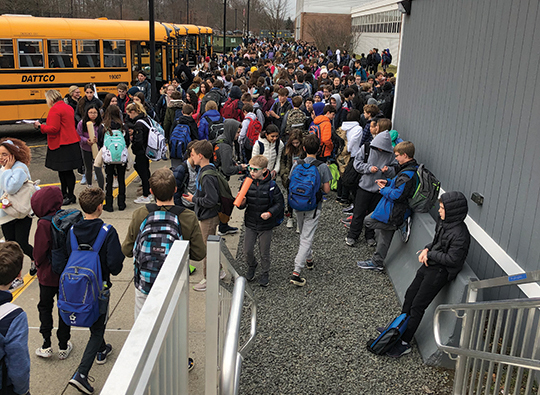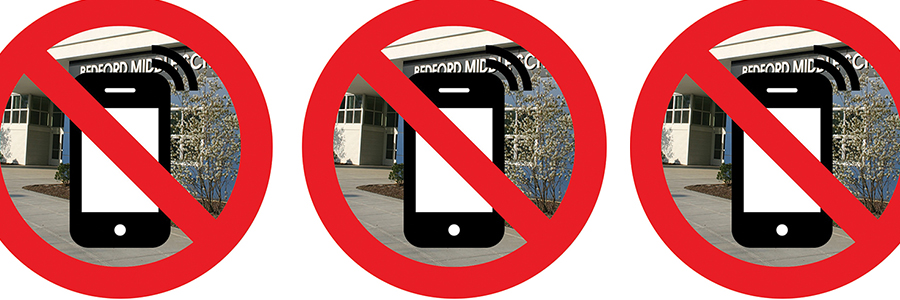School Gets Tough Over Phones
The new announcement arrived in January.
“Students are expected to keep their cell phones, smart phones, mobile devices locked in their assigned lockers for the duration of the school day. Phones are not to be used between 8 a.m. and 2:45 p.m.,” said the announcement broadcast over the school PA system.
Bedford teachers and administration have decided to more strictly enforce its ban on cellphone usage. This new plan cracked down on cell phone usage in the school, solidifying that no phones are allowed in school during teaching hours.
But what is the reasoning behind this sudden addition to the school rulebook, and how is it affecting students?
New Policy Regulations
The new guidelines on device usage in Bedford are just four bullet points in length, but they make the major point clear in big bold letters: Students may not use their phones during school hours.
In addition, if a student is caught with a phone or “mobile 4G device,” he or she must surrender it immediately to the office, where they can pick it up at the end of the day. Fail to pick it up, and their parents must pick it up for them.
Repeatedly breaking the policy may “result in disciplinary action being assigned.” If you use your phone to call your parents to pick you up due to being sick, your absence is considered “Unexcused.” Basically, you have to go through the nurse in order to leave with an excused absence. In addition, teachers running clubs after school may set their own rules about phones in the clubs. So how do these sets of rules affect students?
How Students are Affected
Not that much, actually.
“It hasn’t really affected me,” said Braedan Nahmias, 6th grader, on how the new cell phone guidelines have affected his day to day routine. He overall praised the new enforcement for stopping a slowly growing situation, as he said people were making Tik-Tok recordings in the halls.
“I think a change that they could make is so that kids could have them in their pockets,” said 7th grader Uros Krstic on the matter of how he would change the policy. When asked about how the regulations affected him – if it changed his routines – 8th grader Connor Raybacs responded with a short and concise, “Not really.”
It seems overall that students do not really care all that much about the policy, and surprisingly, tend to have more positive experiences with the new rules. But then, why were the rules put in place?
Why the Policy was Implemented
The major factor leading to the initiation of this new regulation is actually quite simple. Students at Bedford, because of apps like Tik-Tok, were recording teachers and students, which actually is against the law. According to the American Civil Liberties Union of Connecticut,
”You have a right to capture images in public places, but you don’t always have a right to record what people say. Connecticut law makes it illegal to record private conversations without the consent of all parties to the conversation.”

Bedford’s bus loop after school and before school in the caf are the only places and time students can use their phones on school grounds.
Basically, nobody is allowed to take a video of another person without both people agreeing. If people kept these videos on their phones, this would be fine, but people were posting these videos to sites or apps such as Tik-Tok or other video sharing sites. This led to the ban of cell phones.
Another thing banned by this policy was any earbuds of any type, including airpods. It’s obvious why this one was barred. Students can’t listen to the teacher in class, and during the school’s last two fire evacuations, people were listening to music and couldn’t hear instructions.
Also, according to Mr. Stephen Rexford, 8th grade L.A. teacher, who was at the meeting where the policy was discussed, kids who listened to music while writing were taking out their phones to change songs, which caused a distraction.
All of these factors and maybe more pushed the school to impliment the new directions.
Love it or hate it, this new policy is here to stay.
In just four bullet points, the school has heavily discouraged people from playing video games or texting their friends.
Sure, some rulebreakers may still mess around out there – people will always try to push the boundaries of the rules – but the policy really doesn’t hurt anyone overall.



